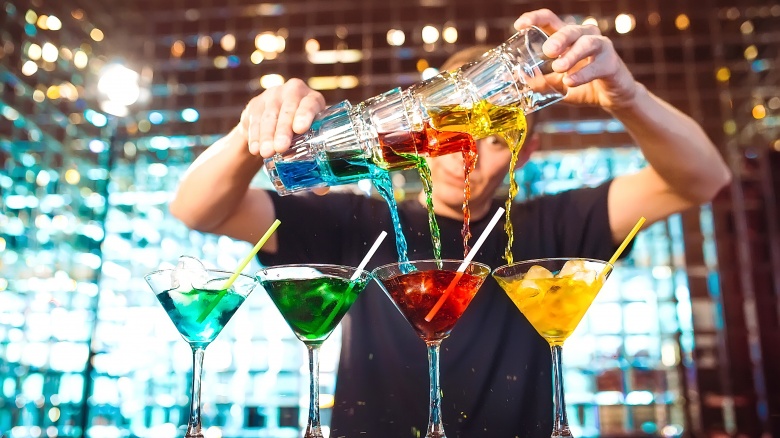Signs You Might Be Drinking Too Much
It's Friday. You've had a long week and can't wait to kick off your heels, settle in for a good meal and pop open a bottle of your favorite Merlot. You've earned it after a stressful week at work.
Or perhaps your idea of capping off the work week is to head out to a club for a drink or two with friends to relieve all that stress and have a little fun. Nothing wrong with that, either. In fact, doctors say a glass of red wine a day is excellent for your health.
The problem creeps in when you start becoming dependent on alcohol, which could quickly become a dangerous addiction that is very difficult to overcome. I know because I went there. Today, I don't drink, but I feel like had I heeded the warning signs of drinking too much early on, I might have avoided the hell I went through and the damage I inflicted on my family, my health, my very life.
Here are some warning signs your drinking is getting a little out of hand.
Is alcohol is the centerpiece of your weekend?
If you can't imagine a weekend or even a day without alcohol, that may be a warning sign. In fact, feeling that any activity must include drinks could be a sign you've become dependent on alcohol.
Having an alcoholic beverage each day can be good for your health, but having your week's worth of glasses in a single sitting negates every single benefit alcohol can offer, and can become a slippery slope into a much bigger problem.
Binge drinking is particularly dangerous because it raises blood pressure and interferes with certain medications. Other dangers of binge drinking include alcohol poisoning, unintentional injuries, sexually transmitted diseases, sexual dysfunction, liver damage — the list is long.
You need alcohol to feel glamorous or confident
From my own personal experience, I found that I came to need alcohol to feel good about myself. When I was younger, I was very shy with some serious confidence issues. With a little alcohol in my system, I felt like the life of the party. I was suddenly the sexiest, prettiest, most intelligent and funniest gal around — at least in my alcohol-ridden brain. But that ideal quickly turned on me, and it didn't take long.
There's even a little science that backs up the notion that alcohol boosts confidence. Researchers conducted an experiment at a local bar, asking 19 people to assess their attractiveness on a scale of one to seven after ingesting some booze. Their alcohol levels were then measured, and the results were pretty interesting: the higher the amount of alcohol drank, the higher the reported self-confidence of the subject being interviewed.
Sadly, this liquid courage can be quickly replaced with horror at the behavior you exhibit while under the influence.
You begin to shirk some of your responsibilities
One sure sign that your drinking is becoming a problem is you begin shirking your responsibilities at work or home.
Do you call in sick repeatedly because of a hangover? Do you find yourself putting off things because you'd rather have a drink instead of getting the laundry done or finishing up a project at work or school? Perhaps you're distracted at work because all you can think of is the drink waiting for you at the end of the day.
These can be signs that you have a problem with alcohol.
People close to you become concerned
When your relationships become affected by your drinking, that's a problem.
Have those closest to you commented on your drinking or voiced concerns that something is just not right with you? Or do you find yourself evading those closest to you to avoid any confrontations? I found that with my drinking, I became more and more isolated from the ones I love. The last thing I wanted was to be confronted by my friends and family. I thought I had it under control, and they just didn't understand the things I was going through that made me want to drown my sorrows.
Do you find that you hide your drinking so no one knows just how much you was consuming? While you may not yet be addicted to alcohol, drinking alone is certainly a red-flag situation.
Alcohol dependency and addiction can become a very lonely experience.
You self-medicate
Do you find your drinking is tied to your emotions? Do you drink to feel better when you're down? Do you drink to avoid facing the difficulties of life or a traumatic experience? If so, you are self-medicating and this is never a healthy behavior. One study even found self-medicating to be the coping mechanism of choice for many suffering from PTSD. If you find yourself reaching for a drink when you start feeling down, it may be time to take a look at the causes behind your feelings instead of covering them up.
You've developed a high tolerance
If you have a problem with alcohol, you may find you need more to get that warm, fuzzy feeling again. That's because your body has become accustomed to alcohol and your brain has developed tolerance. It demands more to get that same feeling. As this tolerance increases, you may soon fall into dependency and eventually, full-blown alcoholism.
Other organs in your body adapt to high alcohol consumption, as well. When you begin to drink large amounts of alcohol on a regular basis, your liver adapts by producing larger amounts of the enzymes needed to break down the alcohol more rapidly than it does in people who rarely drink. The liver actually becomes more efficient at metabolizing alcohol so you need more to achieve the same effect.
If you don't get your drinking in check, you may soon come to find that the only way to feel normal is if you have the needed alcohol in your system. You've passed the brink where alcohol brings any pleasure anymore. In fact, you stop feeling the buzz from alcohol at this point, and you can't go about your normal activities without the alcohol your body needs.
There's a good chance you're already in the drinking danger zone
A record number of Americans are in or are entering the drinking danger zone, researchers say. According to one study, roughly one-third of American adults at some point in their life have or will suffer from an alcohol use disorder, with only 20 percent of those seeking treatment.
"These findings underscore that alcohol problems are deeply entrenched and significantly under-treated in our society," said NIAAA Director George F. Koob, Ph.D. "The new data should provide further impetus for scientists, clinicians, and policy makers to bring AUD treatment into the mainstream of medical practice."
The scary thing is that you may be thinking that you've got your drinking under control. Well, you may need to think again.
Your drinking danger zone is different than people around you
We are all different and our bodies process what we put into our bodies differently. When it comes to alcohol, not everyone is created equal. Men do a better job of processing alcohol than women, so trying to keep up with the boys might not be the best idea. In fact, it could be very dangerous.
"It's easier for women to suffer acute alcohol poisoning that could lead to death because it could take only six or seven drinks for someone who is 5'3" and 115 pounds, while it may take twice that amount or more for a larger man," said Gregory A. Smith, MD, an addiction specialist at the Comprehensive Pain Relief Group in Los Angeles.
Your ability to metabolize alcohol is also dependent on your genetics. Research indicates that your genetic makeup could be responsible for about half of your risk for alcohol use disorder. While genes do not necessarily determine whether you will become an alcoholic, it is worth exploring your family history to determine your risk.
One other thing to consider is that binge drinking becomes more dangerous with age because the way your body metabolizes alcohol changes over time. This might explain why you can't quite seem to recover from a night out the way you once did.
Drinking too much and too quickly can literally change how your brain works
Your alcohol consumption may be completely changing the way your brain works. How much, how often and the speed at which you down that drink can affect how much alcohol is lingering in your brain, which can lead to dangerous changes in the way your brain functions and what it needs to get you through your day.
The rate at which you pound those drinks can also have an effect on how you metabolize the alcohol. Your liver can only process one ounce of alcohol in an hour. That means one shot of liquor, one normal-strength, 12-ounce beer or one 5-ounce glass of wine. If you drink faster than that, your system becomes saturated. Additional alcohol accumulates in the blood, the brain and body tissues until it can be metabolized. Eventually, this can change the way your body functions.
Take a good look at your own relationship with alcohol
In the end, you may not have a problem with alcohol and can enjoy a glass of wine from time to time. That's awesome because you are also reaping the health benefits of moderate drinking. Enjoy!
Be careful, though, that you are not deceiving yourself. If you are experiencing any of the warning signs, it may be time to put down the glass and enjoy a different way of living. I did and I don't miss alcohol in the least. I don't miss feeling sick much of the time, and I certainly don't miss the ball and chain that alcohol represented in my life. I needed to seek treatment, but it was the best experience ever. I was able to face the situations that hurt me, the very things that led me to finding comfort in a glass of wine in the first place.
I love the freedom that giving up alcohol brought to my life.
My confidence has never been higher and I have more fun than I ever did. When I think back to my romance with alcohol, I shudder at the thought.
Think about it. Your decision to put down the glass may be the best decision of your life.











